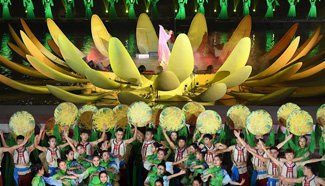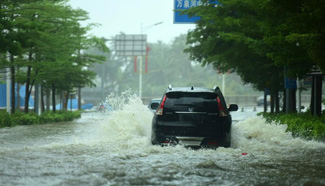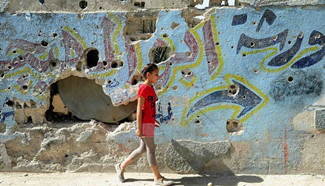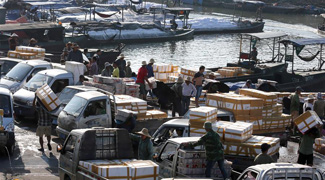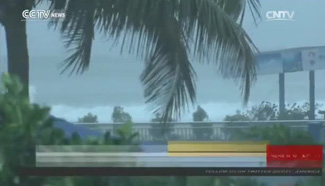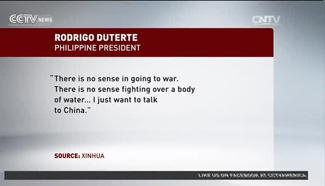by Osama Rady, Omar Othmany
GAZA, Oct. 18 (Xinhua) -- For thousands of farmers in the Palestinian Gaza Strip, olive harvest season is a chance to gain some money amid the dire economic and living conditions caused by Israeli restrictions on the movement of people and goods.
The family of Kamal Obaid, from Gaza City, work shoulder to shoulder in harvesting their eight donum (1 donum is about 1 acre or a little more than 900 square meters) olive garden with much joy amid a cheerful atmosphere.
In the Gaza Strip, a tiny coastal enclave ruled by Islamic Hamas movement, olive industry has been a major business for thousands of farmers.
The harvest season is largely celebrated by farmers who spend a whole year taking care of the trees to ensure a bountiful crop of olive and an excellent produce of olive oil.
Every single member of Obaid's family, from grandparents to grandchildren, put their efforts together to harvest their olive trees.
While men harvest the olives using tall ladders, women help by taking different tasks. While some prepare tea for the family, others sit on the ground and very thoroughly pick up the crop and pile it up to be sold.
The 56-year-old man believes this season is the best in decades.
"This season is really great. It is way better than last year. Last season's whole produce of this garden did not exceed 200 kg, but one tree can produce so much this season which is really great," Obaid said he collected fresh olive fruits.
The olive harvest season in Palestine starts in the beginning of October till the end of November. Most of farmers sell their crops as raw fruit in local markets, while others take the produce to mills for making oil.
Tens of thousands of olive trees, which are considered symbol of Palestinian culture, have been uprooted by Israeli troops during military conflict with Palestinian armed groups in the past decades in Gaza.
The territory has also been under a tight Israeli blockade since Hamas movement violently took over power there after routing government troops in 2007.
The blockade has pushed Gaza's two million population deeper into poverty as unemployment rates hit 43 percent.
In the recent years, Israel and Hamas have been engaged in three major wars that claimed the lives of thousands of Palestinians.
According to official figures, Israel's war on Gaza in 2014 destroyed 10,000 donums of land planted with fruits and other crops, 5000 of them were planted with olive trees.
Obaid was one of those farmers who lost some of their olive trees in the war.
"I have another three donum and a half farm of olive trees and it was totally destroyed during the war in 2014," the man said bitterly as he watched his grandchildren taking part in the harvest.
Obaid added that the uprooted trees were over 60 years of age, saying it was a grave loss since the farm was a respected source of income for his large family.
"It also provided job opportunities for family members who wait for the seasons impatiently," he explained.
Thanks to this generous season, the Hamas-run agriculture ministry expected that Gaza will not import any olive or olive oil this year.
According to the ministry, Gaza olive farms are expected to produce some 3500 tons of olive oil and 30,000 tons of olive fruits.
The ministry attributed the abundant crops to last winter's plentiful rain in addition to planting thousands of new blossoming olive trees after the recent wars.
The olive business is considered to be the backbone of Gaza's agricultural sector as 38,000 donums in the 360 square km seaside territory are planted with olive trees.



